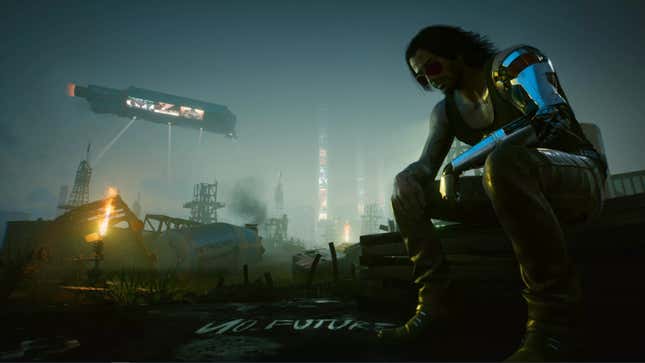
After eight years of waiting and what felt like one million years of edgelord-baiting pre-release hype, Cyberpunk 2077 is finally out. The game is many things, but if nothing else, it is certainly vast. That in mind, Kotaku editor-at-large Riley Macleod, video wizard Michael Pasquariello, and I got together to talk about how we’ve approached it so far, our playstyles, and how early choices like character gender, whether or not to kill enemies, and how to handle certain sticky story situations have impacted our experiences.
(Note: This post includes some light spoilers, though nothing too major. Spoiler-y sections are marked as such.)
Nathan: Hey, Riley and Michael. The two of you, like me, have been playing Cyberpunk 2077, the latest game to ask the question “What if the future was bad, but like, in a cool way (that doesn’t address a myriad of modern day issues or ubiquitous elements of the human condition)?” The game allows for a wide variety of choices and playstyles, so let’s start there: How have you been approaching the game, generally? Have you been mainlining the story? Or are the two of you meticulous explorers who try to take in every possible inch of Night City, a place that has more times of day than its reputation suggests?
Riley: I started off just trying to mainline the story for my review, but sidequests are too much to resist for me. Now, I’m sort of swapping back and forth: I’ll mean to do a story mission, but along the way I’ll get a million notifications of other possible quests, and inevitably one of them seems interesting, so I’ll go off and do it, and before I know it hours have passed and I’m like, “Oh right, wasn’t I supposed to be doing something for Keanu Reeves?”
Michael: I went about it in a pattern that’s not representative of my usual open world adventures. Normally I try to soak up everything optional before doing the main story, so I can feel powerful in my quest. This time I tried it out in a bunch of different ways. First I made a beeline for the story through the entire first act. I wanted to get to know the characters before exploring the rest of Night City, and I let the game show me around a bit. The next time I picked it up, I set waypoints for side content. I went from gig to gig, busting criminal activity along the way. After that, I did a mix. I’d set a waypoint for a mission, then dabble in one or two things along the way.
I found the last method to be the most enjoyable. It made the activities feel emergent, rather than a dot on a map, and it helped prevent burnout on what could otherwise be an extremely repetitive string of gameplay loops.
Riley, how could you stand up Keanu like that???
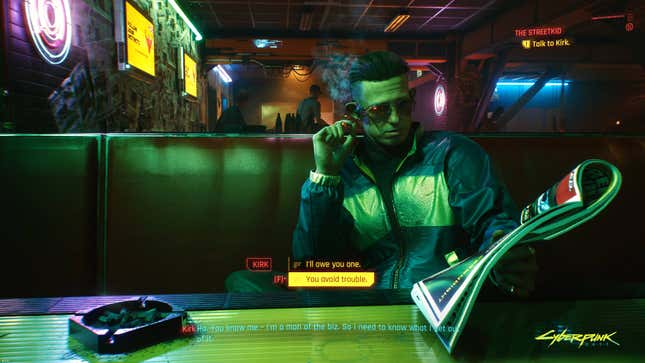
Nathan: Yeah, it sorta feels like the last way Michael mentioned is how it’s “meant” to be played? I noticed that sidequests often seem to pop up based on your location (at least, initially). So the game is like “Well, you could heed Keanu Reeves’ urgent calls to save your own life, or... you could go over here and shoot some guys.”
Riley: I’ve been ignoring a lot of the sidequests that just pop up on the map—they mostly feel like variations of “shoot these guys, now shoot these guys,” but I will happily drive halfway across the city to do someone a favor, especially if it seems like a quest with a story behind it.
As I said in my impressions, I find the quest notifications completely overwhelming, though. Stop calling me!
Nathan: Seriously, did we learn nothing from Grand Theft Auto IV?
Michael: I’ve noticed they put little teensy touches on some of the quests to help ease the repetition of ones with similar goals. For instance, there’s a group of gigs that require you to rescue someone. Once it was a Ripper Doc being held hostage, and I had a small conversation in which I had the choice to help her save a violent gang member, or let him flatline. Next it was about finding “cargo” (read: a person) and literally carrying him through a gang area so that we could make a getaway. I appreciated that each one wasn’t so strict in its premise.
The amount of calls and texts about cars for purchase almost rivaled the amount of dildos in the game. Like, am I the only one in the market for a vehicle in Night City?
Riley: Why would you ever buy a car in this game? There are cars everywhere. That said, calling your vehicle is a lot like calling Roach—recently, my motorcycle showed up, but it just drove around me in circles so I couldn’t get on to it.
Michael: That’s hilarious! That never happened to me, but I almost wish it did. How glorious the smart future can be.
Nathan: Oh yeah, the other day mine came from, like, 500 meters away. It was hilarious. It did this insanely fast loopty loop down the highway. I’m glad that at least that part of The Witcher’s spirit is present in this game. The cars were apparently coded in the likeness of (and perhaps even by) Roach, a digital horse.
Riley: I think the cars are really well done, though! If I ever have enough in-game money, I would probably buy some of the cars. They do really drive differently, in my experience, as CDPR said they would.
Michael: They drive differently, and each has a detailed interior that I always enjoyed taking a peek at.
Nathan: See, this is one of those things, though, where it’s like “Is it really worth it?” All the extra work from overworked developers that must have gone into that level of detail for a feature at least two of us don’t even really care about, because to Riley’s point, there are cars everywhere! They are disposable by definition.
Riley: Yeah—they’re really great, but I barely spend any time with them. But I bet someone will? I try to tell myself, “I bet someone was really excited to make all these cars.” Or overworked and exhausted. Or both!
Nathan: Cyberpunk car people, if you are reading this: Did you like making the cars?
Michael: There’s a point to be made about how much work goes into something vs. the percentage of your userbase that will experience it, especially if the design of the game doesn’t lead you towards soaking that content up in the first place. This game is full of tiny details I appreciate, but I do wonder how many players gloss over them. I suppose it’s down to the kind of player you are, and what you want out of these open world games with a focus on immersion.
Riley: I’ve been going out of my way to poke around all the details, and there’s so much going on in the margins. It’s really cool, and it’s so obvious to me that tons of work went into it, but it’s just as easy to totally skip over if you’re driving to a mission or in the middle of a gunfight. The TV channels are great, though. Big fan.
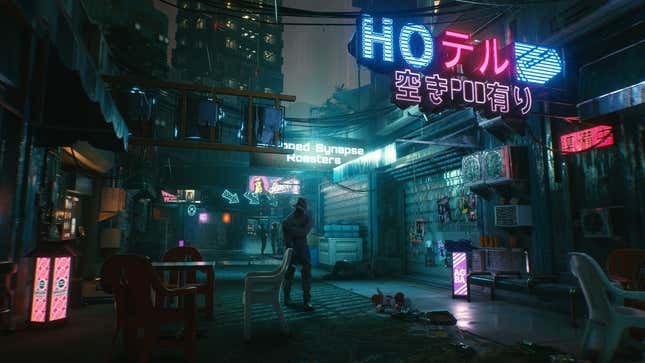
Nathan: Yeah, on paper, I love hyper-detailed video game cities. But when I’m in them, I mostly stick to very video-game-y activities (combat, collecting, sidequesting, etc) rather than just, like, taking them in. Which makes sense: It’s a video game. But that’s the contradiction at the heart of any of these games: Why have the hyper-detailed city that took massive amounts of work in the first place if the game is only sorta about that place? And the mechanics are not really about appreciating the location at all?
Michael: For sure, the gameplay loop is totally separate from the detail in the world. But does the detail enhance your engagement in the game? If you took out all those little details, do you feel that your level of engagement would stay the same? I think there’s an element of subtlety to a lot of it. For instance, I don’t often stop and stare at the painting I have on my wall, or the dressings on my work desk, but without them my environment can feel flat, if that makes sense. I guess that begs the question of how far do you have to go in that regard before you get diminishing returns.
Nathan: Yeah, I think it becomes a matter of degrees of detail. Most environments in the new Assassin’s Creed, for example, while detailed, are not this detailed. But they get the job done.
Riley: I think this is one of the reasons I tend to walk a lot of places in the game instead of driving. I’ve been enjoying poking around at everything, even if it turns into, like, last night when I played until 2am and only completed two—to be fair, very meaty—sidequests.
Nathan: I walk everywhere, too! I have found it to be much more rewarding. Where possible, I don’t even fast travel.
Riley: Yeah, I try not to fast travel unless I feel like I’m completely turned around.
Nathan: I will say that, more than in other video games, Cyberpunk makes it fun to just poke around—even if it doesn’t really incentivize it mechanically. As Riley and I have talked about before, it does a good job of feeling like Another Place.
Michael: Definitely. One of my favorite little details that I talk about in the impressions video is the crosswalk system. I know it’s silly, but the sound of it: “Walk. Walk. Don’t walk. Don’t walk.” Seeing people obey it. Seeing the details on the crosswalk change according to the direction. It added a lot to that “lived-in” feeling for me.
Riley: Ah ha, I love the crosswalks! I’ve found a grand total of, like, four parking spaces in the game, though.
Michael: I wonder if we’re supposed to assume that it’s normal to just get out of your car and hope it’ll drive itself somewhere safe.
Nathan: One of my favorite things the game does, come to think of it, is when you take rides with other characters. You get to take in the city (since you’re not driving) and have a chill conversation inside a hyper-detailed car. I won’t go so far as to say those moments justify all the labor that must have gone into them, but they are exactly my shit. I love it when games give me cool ways to hang out with likable characters, and in Cyberpunk—a game that’s surprisingly nostalgic, especially about the ‘80s—riding around in cars with criminals fits the bill perfectly.
Riley: I was recently in a mission with an NPC driving me around, and I was obsessed with his driving. He’d turn really slow and I was just like, “Merge, buddy! I believe in you!” I drive like complete shit in this game, though, so I like when another character has to do it. You can skip the car rides too, if you’re a monster or very busy.
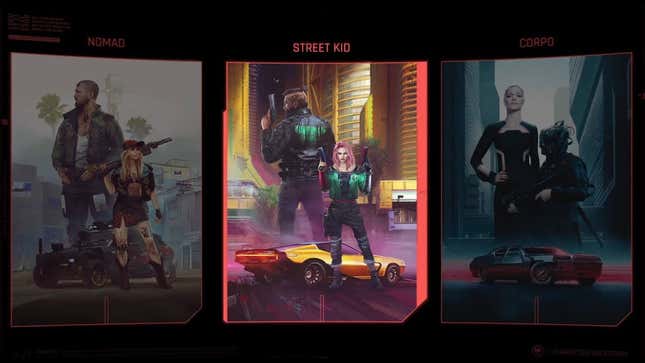
Michael: Speaking of detail, I ended up going back and playing the prologue for each of the “backgrounds” you can choose. Corpo connected me to different characters that I didn’t even know existed while playing as a Streekid. I’m curious how often this background comes up throughout the game. For me it seemed to be present as dialogue options, but I hear it can run deeper than that. What backgrounds did you both choose?
Riley: I chose Nomad, and so far it’s mostly come up in dialogue options and the occasional NPC.
Nathan: I chose Streetkid, and same. Good for detail, but so far, it hasn’t been a choice that’s reverberated in, for lack of a better term, Witcher-like reverberations.
But I think it’s more of a role-playing choice than anything else, and I enjoy when games focus on those sorts of choices. Yeah, they might just add color to a world or character, but not every choice needs to alter the course of a game. Sometimes, I just want to embody my character a little more.
My problem with Cyberpunk is that V rarely feels like that much of a character. She’s often very reactive and kind of more a conduit for events than somebody I could describe in the way I might talk about, say, a friend I know pretty well.
Or Geralt of Rivia, for that matter, lol.
Riley: I read this in someone’s review, but the more I play the more I feel like there’s a disconnect between who V is “supposed” to be and their character? Like, I just did a bunch of quests where my dialogue is really nice and caring, and I personally like that, but I’m also like, “Aren’t I supposed to be playing some hardened cyberpunk merc-for-hire?” Maybe CDPR’s thing is “gruff character who’s secretly nice.”
Nathan: Right. I don’t think it’s as seamless as in The Witcher. No matter what choices you made in that game, it felt like something Geralt—as stoic and gruff as he acted—would do. Whereas I still can’t really pinpoint what V is about. Is she secretly kind and caring? Or is she intense, hardened, and distant from the plights of others by necessity?
Michael: The hardened cyberpunk merc-for-hire shtick seems more in-line with what the game wants V to be. I feel like sticking to that all the way through might make V pretty unlikable. There were some lines where I immediately thought “that’s not something I would say, or how I would say it.” I wonder if V’s likability came up at all during the dev cycle and that’s why we have a character that’s sort of all over.
Nathan: I try to play her like she’s decent, if not exactly a bleeding heart. Like, I often choose rude or curt dialogue options, especially when dealing with obvious lowlifes, but I still try to help people as much as possible. I tell Johnny to fuck off a lot. Also, I try not to kill anybody. I use stealth chokes (instead of kills) and nonlethal guns and melee weapons, where possible. My version of V justifies it to herself by saying she does it for efficiency’s sake and to keep missions clean, but I also think maybe she’s sort of an OK person?
Michael: I started off that way too, but ended up letting the evil take over once I had trouble getting into V’s shoes. But it depends on the ask: If I’m meant to save someone from some horrible thugs, I’ll go in with a bloodlust. If the situation is less dire, I’ll set phasers to stun.
Riley: I want to play non-lethally, because that is how I am, but stealth can be so hit or miss that it’s hard. I have a mod that turns my gun non-lethal, but I think I’ve never been able to decide which gun to put it on.
I did a sidequest to rescue someone, and I started off stealth, blew it, and just killed everyone, and then the character I was rescuing was upset with me. And I was like, “well that’s fair,” but also, I don’t really feel that? So many NPCs are just Generic Enemy, it’s hard for me to really feel their loss.
(Minor spoilers begin here.)
Nathan: Yeah, and again, because the game is buggy and this sort of gameplay is not CD Projekt’s forte, you never know if enemies are gonna be dense as hell or capable of seeing through walls. I can only reload a save so many times before I say “Fuck it” and shoot everybody.
That said, the game has acknowledged my silent approach a couple times, which I appreciate. At one point, Judy, who I am trying to romance, was like “You don’t waste a bullet, do you?” after we’d painstakingly stealthed through a 40+ minute mission, and I was like “Aw thanks, Judy! Kind of you to notice.”
Riley: So the romance options! There are sex workers you can sleep with; my V is a trans guy and has slept with folks with different gender presentations. And then there are some characters you can romance. There’s one character I found myself really wanting to romance, even though there’s some reasons why I didn’t want to want to. The other night I went on every one of their quests, and then they invited me to their house and I was like “clearly it is the time for kissing.” And we do all this really nice stuff, and then we go off on our own, and like everything in the scene is saying “kissing, kissing” and then—we didn’t kiss! They turned me down! And I spent like an hour and a half re-loading the scene trying different choices, including some that felt really alien to my version of V, and nothing worked. I even made some, like, flowcharts, and—zip. I’m crushed!
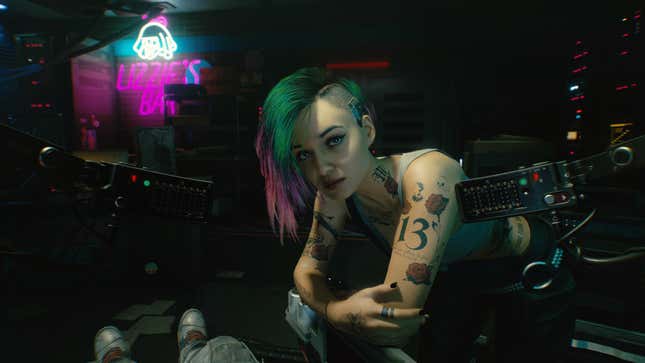
Nathan: Riley, that is heartbreaking. I am legitimately very sorry you couldn’t kiss the virtual boy (as opposed to The Virtual Boy, which no one should kiss).
Riley: I’m looking at some guides now, and it’s weird because the guide is telling me I can’t romance them as the gender I am, and that makes no sense to me! Because the scene is so clearly written as “romance times,” like why would you write the whole scene? Just don’t give me the option!
Michael: If it’s a gender thing, that’s really a bummer! Seems at odds with the options available to you in the character creator, no?
Nathan: It does and it doesn’t, right? Because ultimately, the character creator still presents gender as a binary—just one rooted in voice, rather than physical characteristics, for some arbitrary reason. This, I think, is a big downside of presenting gender that way.
Riley: Yeah, the gender options look progressive on their surface, but ultimately aren’t that exciting, disappointingly.
Nathan: And they lead to weird contradictions like this one, where even the game’s own internal logic falters.
Michael: Sort of a half step. Like Riley said, it’s just on the surface.
So before the big finale to Act 1, you’re tasked with retrieving a device for Dex, and this part feels like a good showcase for player choice and how it can affect your outcome. I went to parley with the gang directly without even thinking about seeing what other threads I could follow. I was really surprised to hear about both of your outcomes. For me, apparently they didn’t like the tone of my voice, and things with Royce and his crew got ugly.
How did you two prevent a bloodbath? It seemed like the only way forward for me!
Riley: So I ended up allying with an outside party by complete accident—I stumbled upon them and suddenly a lot of people were yelling cyberpunk things at me—and then through that the scene ended in a shootout between the gang members and that particular outside party, and I got out pretty unscathed. I figured “oh, this is just what happens in this quest!” so I was really surprised to hear it went differently for you all!
Michael: I feel like people yelling cyberpunk things at me is a good summary of most of my time in Night City.
I fancy myself the kind of player who seeks out every option and looks in every corner before making a decision, and it’s so intriguing to me I missed alternatives. It makes me wonder what else I wasn’t observant enough to stumble on and how, if at all, it may have altered the course of events elsewhere.
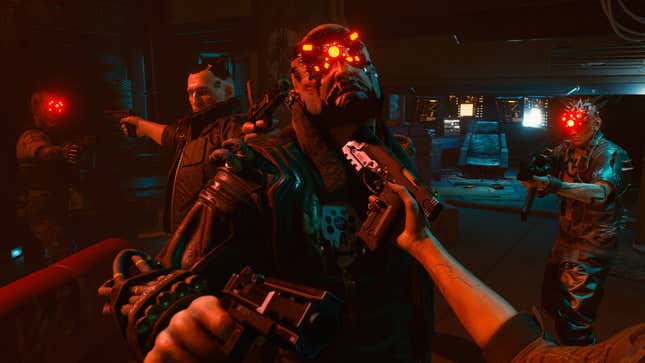
Nathan: I tried to do this all as optimally as possible, but also without selling my soul or compromising any of my values. Surprisingly (for a game as grim as this one can be), it all went off without a hitch! I took Jackie’s advice and ignored a corporation I could have collaborated with, instead opting to go talk to the gang directly. However, while talking to Jackie beforehand, a dialogue option appeared for me to suggest we bypass bloodshed by just giving the gang $10,000. I didn’t have that kind of money at the time, so I couldn’t actually say it. But immediately after that conversation, I sprinted off in the opposite direction of the gang’s lair to sidequest until I obtained $10,000. Jackie was like “Uh, see you later, I guess?” It was extremely funny.
I was worried that I’d missed my one chance to engage with that dialogue option, but after things got awfully close to going awry in my conversation with the gang (this included: multiple men with scary robot faces getting up in my non-scary, non-robot face, having a gun pulled on me, lots of yelling, a failed negotiation to pay less), my character was able to basically say, “We’ll give you $10,000 for it,” at which point all the gang members were like “Oh, for real? Yeah, OK sure, that sounds good, actually.” Then one of them, Dum Dum, who was high the entire time and gave me free drugs, kindly escorted me off the premises and engaged Jackie and me in casual chit-chat until we’d left the compound. It was super chill. I hope I get invited to Dum Dum’s kid’s birthday party someday.
Michael: Dum Dum was oddly endearing to me in the brief encounter I had with him. Before killing him, that is. He was soooo... cyberpunk.
Nathan: I love Dum Dum! Shame he’s not a romance option.
Michael: DLC opportunity?
Nathan: So I like how different my outcome was from y’all’s, but I also do have some qualms with it—mainly, money has very little real value in most open world games, and Cyberpunk is no different. I hardly ever buy weapons or clothes (you can find better ones, generally), so I had a pretty large stack of cash already. It wasn’t particularly difficult to do things this way, and I don’t feel like I made a big sacrifice. That feels weird in a world where everybody is impoverished. I don’t really feel like I’m connected to the plight of the world or its characters.
Michael: There is a bit of a disconnect there. You see civilians struggling, homeless people on most corners, but they’re basically just set dressing. Very dark set dressing. Money could help them eat, get a roof over their heads, and maybe take part in the cyber-mod craze. But money isn’t a thing for you. Clothes come and go, as do weapons, modifications, and dildos. And you don’t even spend a dime.
Nathan: Right. And yeah, you’re a hotshot merc, so you’re naturally gonna have more money than a lot of folks, but by putting you in that role at all, CD Projekt makes a statement. In doing so, they say, more or less, that having you identify with the people in the game world isn’t really the central goal—that, as you said, those people are set dressing. And the game is about other things. Which is not intrinsically wrong or bad, necessarily, but it is something to keep in mind. Even in cases like this, the studio made a deliberate choice and, in doing so, stated its intent.
Michael: For sure. It doesn’t need to have something to say about everything, but not having something to say about what you put forward is still saying something. It would be an interesting exploration of V as a character, and of Night City as a whole, if you could interact with the citizens on that level. But currently it’s an aside that you can pay attention to if you want, or totally ignore as you gun down street thug after street thug.